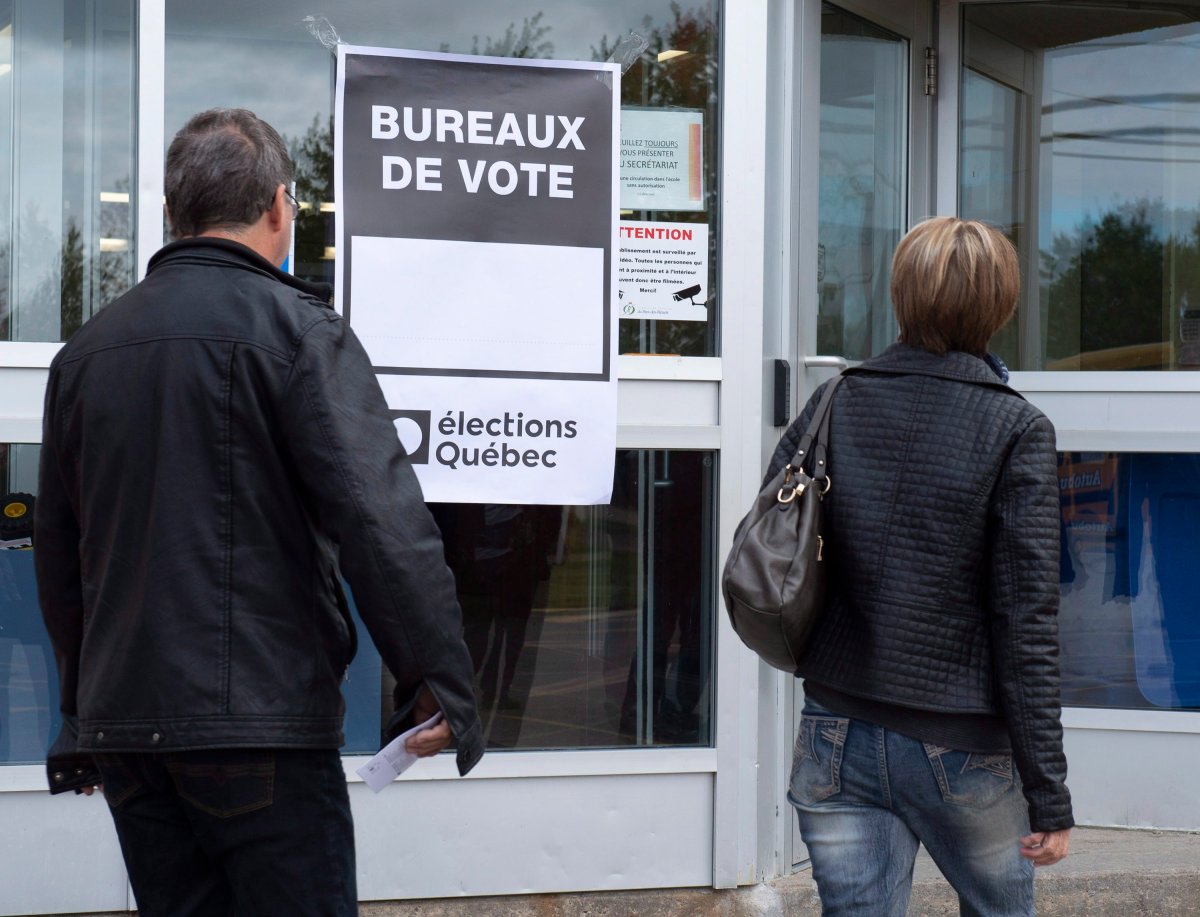Quebecers were voting in a provincial election Monday against the backdrop of a renegotiated trade pact between Canada, the United States and Mexico that was greeted with immediate criticism in the province.

Parti Québécois Leader Jean-François Lisée, his party trailing in third place in opinion polls, seized on the deal to urge voters to cast a ballot for his party, which he said is the best-placed to defend Quebecers’ interests.
READ MORE: What did the parties promise?
“This agreement is a disgrace,” Lisée said after voting in his Montreal riding of Rosemont. “A disgrace for Canada, a disgrace for Quebec. It is an expression of the systemic injustice Quebec is victim of within Canada.”
“I spoke to producers this morning and, even in their worst nightmares, they did not think Canada could cave in this much, to abandon the Quebec milk, cheese, chicken and turkey sectors in order to favour the auto industry.
“When Canada chooses, it always chooses Ontario and the rest of the country and always sacrifices Quebec.”
Liberal Leader Philippe Couillard also expressed disappointment with the agreement.
“What counts for me is life in Quebec’s outlying regions,” he said after voting in St-Felicien in his riding of Roberval.
“We want a type of agriculture in Quebec that is human and family-oriented — and not one that is industerial and in which we lose all capacity to make decisions.”
WATCH: Quebec heads to the polls on Monday where there could be a majority of outcomes

On Sunday, before the details of the agreement were released, Couillard vowed to fight to protect supply management and Quebec farmers.
He said that if the deal required major concessions from the dairy industry, Quebec’s national assembly could declare it is not bound by it. He also raised the possibility of a legal challenge.
“It would be a major political mistake for the federal government to give up parts of supply management without the consent of the producers,” he said.
READ MORE: A last-minute voter’s guide
Coalition Avenir Québec Leader François Legault said he would be speaking later to Couillard and that he wants to study all possible options to defend agricultural producers.
“I want us to be able to look at what is best for Quebec as a whole,” he said after casting his ballot in his riding of L’Assomption, northeast of Montreal.”Compromises were made at the expense of Quebec agricultural producers,” he said.
“It’s disappointing.”
The 39-day campaign ended with the Coalition and the incumbent Liberals locked in a battle for first place.
While Legault began the election campaign as the front-runner, the party’s lead dwindled as the Liberals gained ground later on.
WATCH BELOW: Where the parties stand on health care
Lisée’s PQ entered the campaign as the official Opposition but remained mired in third place in the polls, with the left-wing Québec solidaire snapping at its heels.
The Liberals had 68 seats at the legislature’s dissolution, while the PQ had 28, the Coalition 21 and Québec solidaire three. There were five Independents. Sixty-three seats are needed to form a majority.
While Quebec’s economy has surged in recent years, opinion polls have suggested for months that voters are looking for a change after 15 years of nearly continuous Liberal rule.
READ MORE: Immigration, health take centre stage at Quebec leaders’ debate
- Life in the forest: How Stanley Park’s longest resident survived a changing landscape
- Bird flu risk to humans an ‘enormous concern,’ WHO says. Here’s what to know
- More youth are seeking EI amid rising unemployment rates: StatCan
- Mental health support still lacking 4 years after mass shooting: Nova Scotia mayor
The Liberals have been in power since 2003, with the exception of a 19-month PQ minority government between 2012 and 2014.
With the PQ promising to not hold a sovereignty referendum in the next four years if it wins the election, the campaign focused on immigration, health care and the best way to spend the province’s billions in budget surpluses.
While Couillard touted his government’s balanced budgets and the province’s strong economic performance, Legault positioned himself as the best person to deliver needed change.
READ MORE: What Quebecers should expect from the next government – no matter which party is elected
Both leaders faced criticism at times: Couillard for having reduced health and education budgets early in his mandate, and Legault for a controversial plan to “expel” immigrants who fail to pass a language and values test within three years of arrival.
A Coalition victory would mark the first time in nearly 50 years that the province would be led by a party other than the Liberals or the PQ.
The last other party to hold power was the now-defunct Union Nationale, which led the province from 1966 to 1970.







Comments